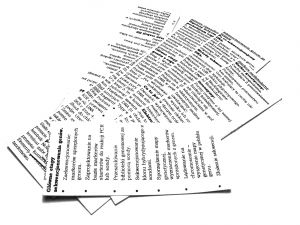 |
Every insurance policy is a separate contract between an insurance company and a customer. When a new insurance contract is considered by the insurance underwriters and issued the first page of the policy is called the “Declarations” page.
The declarations page is the first page of a new policy, with the other policy information such as conditions, exclusions, and endorsements attached. If a policy is renewed and no changes have been made the renewal will be a new declarations page customers should file or attach to the original policy paperwork. Every time a policy renews a new declarations page will be generated.
Declaration pages are important to review carefully. Most of the vital information about the insurance contract policy will be listed on the declarations page. Important underwriting information is also often listed on the dec page.
- Every declarations page will list:
- The Named Insured or insured party.
- The location of the property insured.
- The value and replacement value of property insured.
- The Inception and Expiration date of the policy period.
- The amounts and limits of insurance coverage.
- Deductibles
- Premium Amount
Every policy of insurance should include a declarations page. In the Business of Insurance this Declarations page is usually the only part of your policy that is unique or specific to you. The rest of the policy paperwork will generally be “forms” with specific company wide insurance information that applies to all policy holders within the company in the same state. If you have a local agent, that agent will have a hard or electronic copy of your declarations page.
The most common declarations page you might see is for personal auto insurance. A typical Auto policy declaration includes:
- The year, make, and model of the insured car.
- The vehicle identification number, VIN for the insured car.
- The Names of the insured drivers.
- The policy effective dates.
- The policy coverage types and limits.
- The policy premium.
With an auto policy other important information is usually included such as how the vehicle is used, Business or Pleasure? Lien holder if the car is financed, the lender who holds the loan and has a lien on the car is listed on the declaration as “loss payee” because if the car is completely totaled the loan is reimbursed first.
An auto policy declarations page might also list any discounts or surcharges being applied to the policy. For example you might have an Auto/Home discount for insuring both your autos and your home with the same company. Or an anti-lock break discount because your car has anti-lock breaks. You might notice a driver is being charged “points” for tickets on their driving record. Distance to and from work or school may be listed on the declaration page.
Photo credit for this blog entry:  (no use restrictions for this photo)
(no use restrictions for this photo)
![]() Related Blogs:
Related Blogs:
- The Contents of An Auto Insurance Policy.
- How To Review Your Insurance Credit Score & Other Public Records
- What is Package Insurance?
Glossary of Insurance Terms:
A | B | C | D | E | F | G | H | I | J-K | L | M | N | O | P | Q-R | S | T | U-V | W-Z
Families.com Blogs are for informational purposes only. Families.com assumes no responsibility for consumer choices. Consumers are reminded that it is their responsibility to research their choices properly and speak to a certified insurance professional prior to making any decision as important as an insurance purchase.

